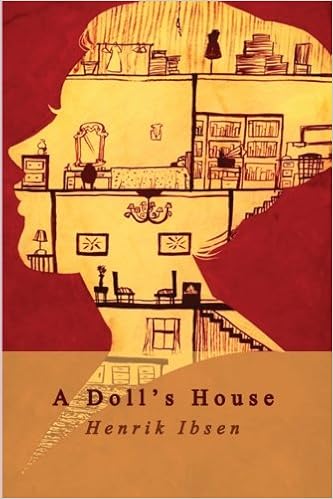For most people believe plays are just another form of entertainment. An audience goes to a theatre and pays for the actors to entertain them. If the performance is acceptable, the company is praised with applause. That's a fairly simple transaction but it's also a limiting one. Theatre, great theatre does more than make people happy, it makes them think. This would upset the audiences who only want to be entertained, if many of them hadn't learned to watch a play while ignoring what it has to say. Then, a play like Ibsen's "A Doll's House" appears with meaning that can't be ignored and the world turns upside down.
 The world of Europe in the 1800's could safely be described as belonging to men. Males held most of the money and power and almost all of the "good" jobs. (Even a monarch like Queen Victoria had substantially limited power.) Women were expected to be decorative, passive guests in mens' lives. Enter Nora Helmer, a little woman with a big, serious secret. Years ago when her father was ill and her husband close to death, she took matters in her own hands. She illegally borrowed the money needed to heal her husband and she's been scrimping and scrounging to pay off the balance ever since. Unfortunately, a man who knows about her crime was just fired by her husband and he's blackmailing Nora to get him his job back.
The world of Europe in the 1800's could safely be described as belonging to men. Males held most of the money and power and almost all of the "good" jobs. (Even a monarch like Queen Victoria had substantially limited power.) Women were expected to be decorative, passive guests in mens' lives. Enter Nora Helmer, a little woman with a big, serious secret. Years ago when her father was ill and her husband close to death, she took matters in her own hands. She illegally borrowed the money needed to heal her husband and she's been scrimping and scrounging to pay off the balance ever since. Unfortunately, a man who knows about her crime was just fired by her husband and he's blackmailing Nora to get him his job back.
If this story happened these days, how would it play out? Nora might get a slap on the wrist from a judge but since she's kept up the payments, the penalty probably would be light. Her husband might be grateful to wife who found a way to save his life. He might even admire how she repaid much of loan without while caring for him and the children. Well, that might be the situation today but it wasn't in the 1870's. Ibsen based his play on a friend of his who fell into the same situation. When that lady's husband found out what happened, he filed for divorce and had her committed to the insane asylum.
 |
| Claire Bloom as Nora in this 1973 Production |
A Doll's House turns out both better and worse than real life. Nora's husband, Torvald, finds out about the deception and declares their marriage is over. When the blackmailer has a change of heart, Torvald changes his mind, still insisting Nora's actions weren't desperate or heroic but just one of those things dumb women do. Nora realizes their life has been based on assumptions: Torvald's belief that his wife is a child and her hope that if he saw her as the adult that she is, he'd love what he saw. Reality kills both the assumptions and the marriage and she leaves him at the end of the play, slamming, as one critic said, "a door that reverberated across Europe."
To say A Dolls House became a pop culture phenomenon is like saying Noah got a bit wet. It was the scandal of the age with actresses refusing to play the part as written and people fighting about the play over dinner. Nora was praised or condemned in the papers and from the pulpit and, for all the fuss she caused, you would think she had killed a real man instead of leaving a fictional one. In a way, her character killed something worse; she murdered people's assumptions about their own lives.
So "A Doll's House" became a classic and part of feminist literature but that understanding of the play is too narrow. Ibsen's play resounds in any time and place where one part of humanity fails to recognize the human dignity of another. In the end, it doesn't matter if we are male or female, gay or straight, and any shade of the rainbow; we are all human with the same capacities to love, need and strive. To discount those capacities or assume they don't exist because of what makes us different, creates a wall of dangerous assumptions between each of us. Until, of course, another play comes around that shoots down those assumptions. Then the world turns upside down.
No comments:
Post a Comment